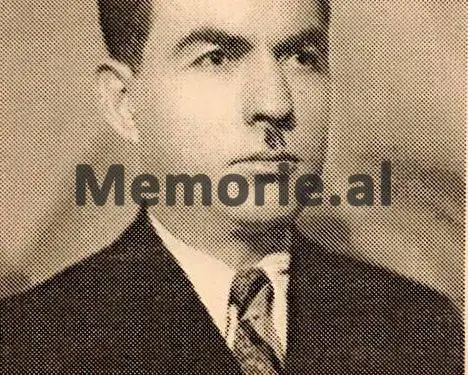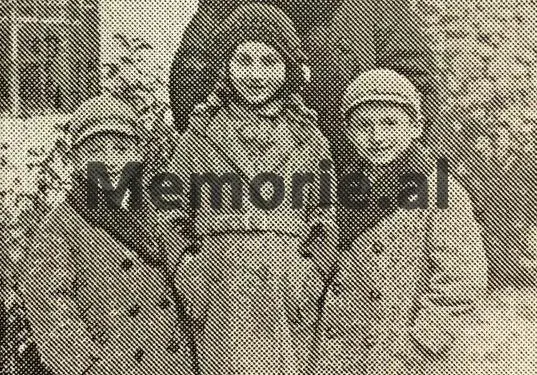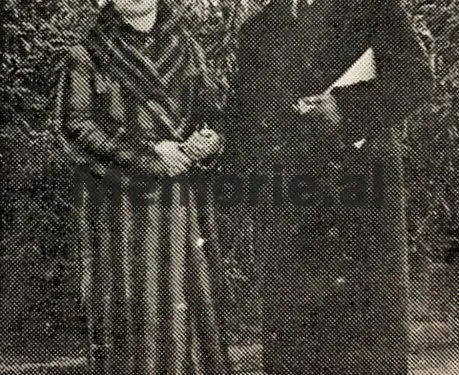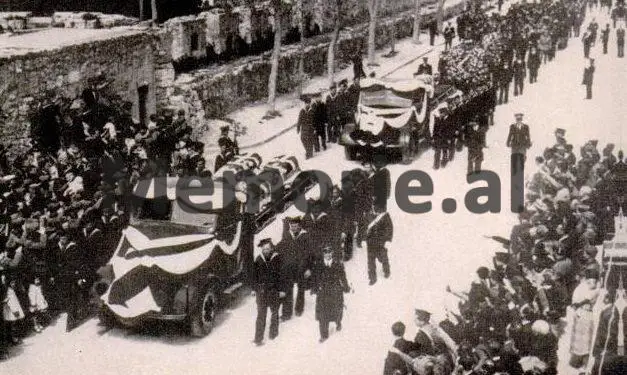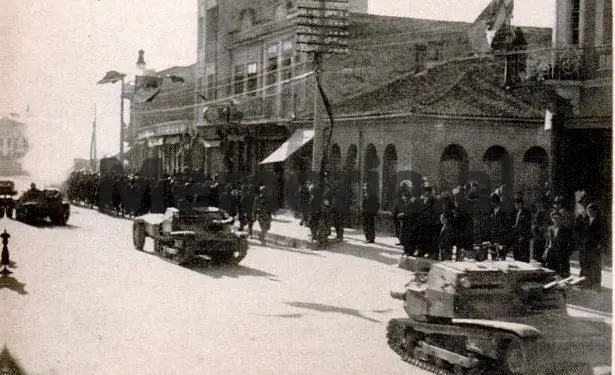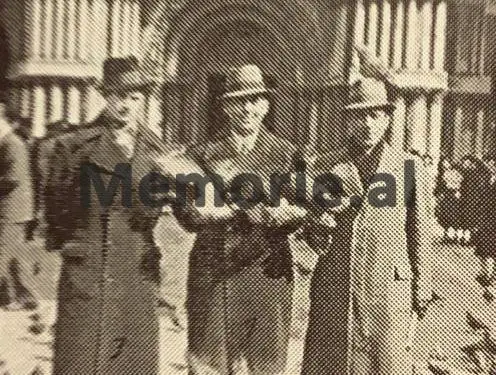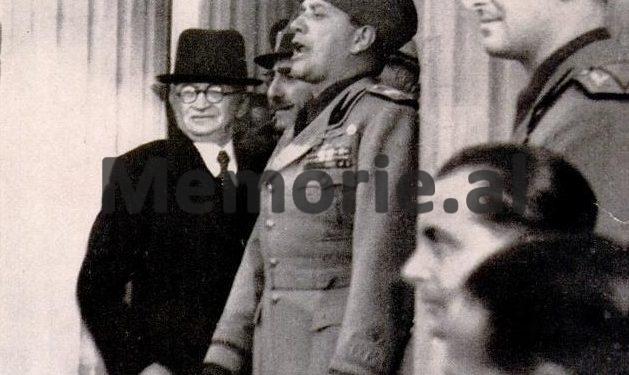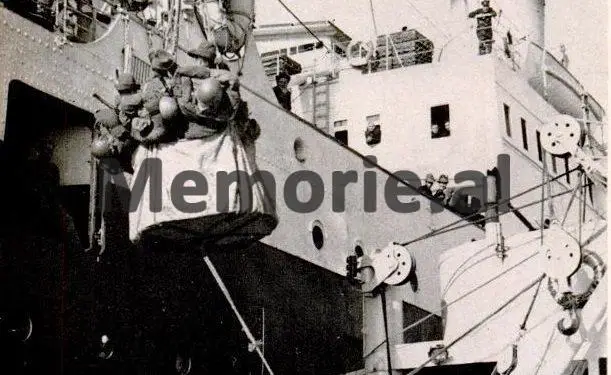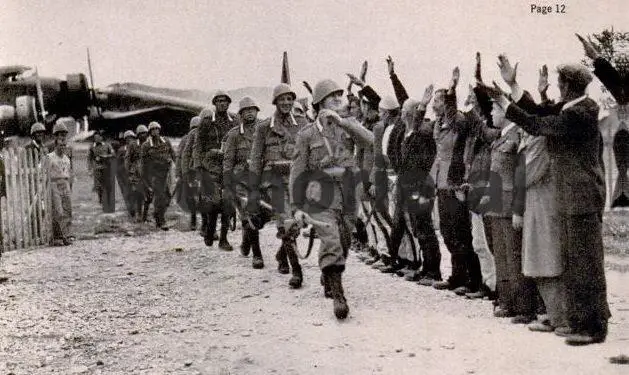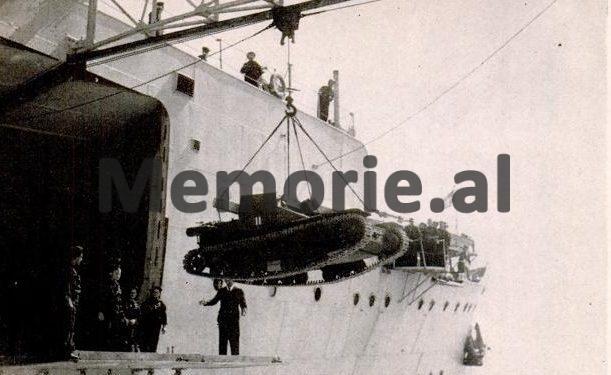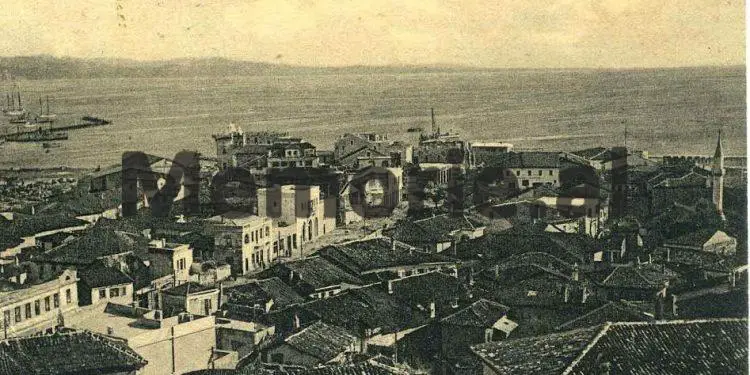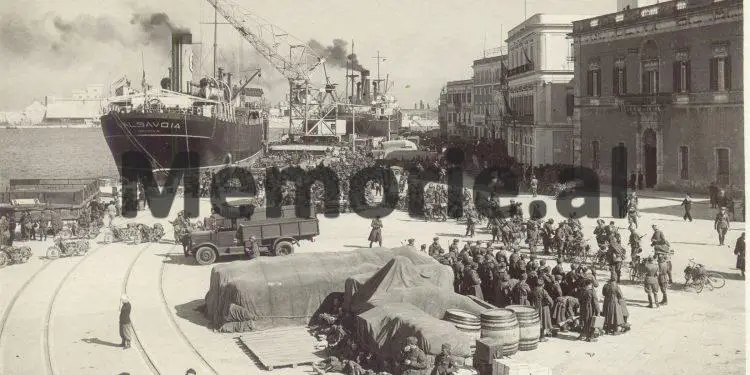Dashnor Kaloçi
Memorie, al publishes the unknown story of Rustem Ymer Skënderi, originally from Dibra e Madhe, who after being educated at the Faculty of Law in Thessaloniki, where Albanian students chose him as a representative to raise the flag in Vlora in 1912, where he had a long conversation with Ismail Qemali, he was expelled from the faculty after dealing with the distribution of Albanian books given to him by his former teacher, Hoxh Vokrri, (Najdeni). Rustem’s political and administrative career from 1915 as secretary of the Municipality of Dibra, until April ’39, as mayor and prefect in Berat, Elbasan, Vlora, Korça, Shkodra and Durres, where he contributed special in the design and implementation of regulatory plans of those cities. The testimony of his son, Mensur, about the career of Rustem, a close friend of King Zog, who as mayor of Durrës on April 7, 1939, delivered a speech from the balcony of the City Hall where he condemned the occupation, for which he was interned by the Italians on the island of Ventotene and after the end of the war by the communists, interning him in the villages of Myzeqe, Radostima, Shtyllas and Kuç of Kurvelesh, where he lived a difficult life.
“On April 7, 1939, he found my father, Rustem Ymer Skënderi, in the position of Mayor of the city of Durrës, and on the morning of that day, he came out on the balcony of the Municipality, where he gave a speech in front of the people who were gathered there, openly condemning the fascist occupation of Albania. At the end of his speech, Rustemi called on the people to take up arms and shoot the Italian aggressors who had arrived with their warships very close to the Albanian shores, telling them that he had given the order to open them. weapons depots for volunteers who wanted to fight. “As a result, he was arrested a few days later by Italian authorities and imprisoned in the Bari prison in Italy, and then in an internment camp on the island of Ventotene.” This is how Mensur Ymeri, a well-known former lawyer, remembered the story of his family and father, Rustem Ymer Skënderi, who during the years of Zog’s Monarchy, served as Mayor and Prefect, in almost all major cities of Albania and 7 April ’39, he found himself in the position of mayor of the coastal city where the invading troops of Benito Mussolini had just landed.
The Ymeri family from Dibra e Madhe
Rustem Ymer Skënderi was born in 1892 in the city of Dibra e Madhe, where his family originates, one of the most famous in that province. Rustem’s father, Ymer Skënderi, with his wife Ruzhdien, had two other children, Rasim and Nafien. At the beginning of the last century, the Skënderi family lived in the center of the city of Dibra e Madhe, where they were known as a rich and aristocratic family. Continuing the tradition of the first members of his family, Ymer Skënderi, he took care that his two sons: Rustemi and Rasimi, also studied in high schools. The eldest son, Rasimi, after graduating from the Faculty of Law in Istanbul in the first years of the last century, returned to Albania with his Turkish wife and during the period of the Monarchy, he served as a lawyer and then as a lawyer in some districts of the country. While his brother Rustemi finished Turkish high school in the town of Dibra e Madhe, where under the care of the great patriot, Hoxha Vokri (Najden), in addition to Turkish, he also learned French. After graduating from high school with excellent results, Rustemi was sent to continue his higher studies in the city of Thessaloniki, but after several years of study, he was expelled from the faculty, because he distributed books in Albanian, which he has given to him by his former teacher, the patriot Hoxha Najdeni. Also in his exclusion from the University of Thessaloniki, influenced the patriotic activity he carried out in the circle of Albanian students who were grouped in a society which was led by the patriot Dervish Hima. After being expelled from the faculty, Rustem Ymeri started working in an alcoholic beverage factory and never severed ties with the circle of Albanian students in Thessaloniki and other patriots who had settled there as immigrants.
Rustem in the Declaration of Independence
Given the great patriotic activity for the benefit of the Albanian cause that Rustem Ymeri developed during the period he was in Greece, in November 1912, the Albanian emigrants chose him as their representative and delegated him to participate in the establishment of The flag in Vlora. In this regard, his son, Mensur Ymeri, testified: “During the free talks that Ismail Qemali held after the founding meeting with various representatives who had gone to participate in the act of the Declaration of Independence, the elder of Vlora spoke orally with my father, Rustem, paying special attention to him and at the end of the conversation described him as one of the young people with a future that could give his contribution to the construction of the new Albanian state. After leaving the city of Vlora, Rustemi returned to his hometown to be with his family, after being informed about the reprisals undertaken by the Serbian forces in that province. From the beginning of 1913 until the beginning of 1914, the father stayed in Dibra e Madhe, where together with many other patriots from Dibra, he engaged in various activities for the consolidation of the newly formed new Albanian state. As a result of that activity, he was arrested by Serbian forces but managed to escape from them while they were transporting him in a wheelchair to the prison in the city of Dibra e Madhe. In retaliation for his escape, Serbian forces set fire to his house in the center of the city, after which it became impossible for him to stay further in Dibra e Madhe. After that, Rustem and his family and two cousins: Ferit and Qazim Skënderi, moved from there and came to the city of Tirana, where they bought a house in the place called “Mahalla e Dibranëve”, testifies Mensur Skënderi, for his father and his, Rustem, who participated in the raising of the Flag in Vlora and was praised by Ismail Qemali as a young man with a future.
1918-1939, prefect and mayor
Regarding the further activity of Rustem Ymeri, his son, Mensuri testifies: “In 1915, Rustemi enrolled in a course opened by Aleksandër Xhuvani, for the preparation of Albanian language teachers, with young people from all over Albania… After completing that course, Rustemi volunteered and went to open the first Albanian school in the village of Brezhdan in Dibra e Madhe, where he worked for about a year and a half, and then he was called to the city of Peshkopi, where he was appointed to the function of the Secretary of the Municipality. During that time Rustemi met and married our mother, Edije Bardulla, who was the daughter of a family very well known for its patriotic traditions in the city of Peshkopi. Afterward, Rustem went to the small town of Shijak where he had been appointed as a teacher, and an early 1918, he left and went to the town of Pogradec, where he was appointed deputy prefect. Even in that city he did not stay for more than a year, because from the middle of 1919, Rustemi went to the city of Lushnja, where he was appointed with the same task he had performed in the city of Pogradec. In January 1920, he found Rustem in the position of Mayor of Lushnja, and during that time, he personally dealt with the preparation of the congress held in that city. From that time until 1939, for more than twenty years, my father Rustemi served in the functions of the prefect, deputy prefect, and mayor, in some of the most important districts of the country, such as Berat. Elbasan, Vlora, Korca, Shkodra, and Durres. Rustem was considered one of the most capable officials of the local government administration of the Monarchy and during that period of nearly twenty years, at the insistence of King Zog, he served in several districts of the country, where the situation was more problematic. During those years, in close cooperation with the relevant ministries, Rustemi paid special attention to the regulatory plans of the cities where he served, such as Shkodra, Korça, Elbasan, and Durrës. With the funds allocated by the governments of that time, he took care and built some of the main streets and centers of those cities, the photos of which we still have today in the albums of our family. From those constructions we can mention the fountain in the center of Durrës and the boulevard in front of the Prefecture of the city of Shkodra. Also, during those years, the father paid special attention to the problems of education and culture, as he had been a teacher himself. He tried and helped with state scholarships many young people from Dibra who continued their studies abroad, where one of them was Dr. Hiqmet Dibra, whom my father kept in our house in Tirana. Likewise, during the Monarchy period, my father took care of our education. My other brother, Ymeri, and I graduated from the French Lyceum in the city of Korça, and our sister, Myzejeni, graduated from the Queen Mother School in Tirana. In addition to performing state duties, Rustem was also very fond of books and in our house we had a very rich library. When he was in Korça, his father prepared a large four-language dictionary, which was published by Dhori Koti. During those years, he was also very involved in journalistic writing, which he published in the Albanian and Italian press, under the pseudonym “Dushkani”. For the good work he had done, in 1938, King Zog decorated his father with the “Order of Skanderbeg”, Mensur Skënderi recalled, for his father, Rustem.
Mayor of Durrës in 1939
During those years that Rustem served in those great cities of Albania, in addition to the great friendship he had with King Zog, he also made friends with many other personalities of politics and art, such as Lef Nosi, Aleksandër Xhuvani, Padër Gjergj Fishtën, MP Selim Mborja, Korça publisher Dhori Koti, merchant Petraq Katro, Benusi brothers from Shkodra, Korça family Turtulli, etc. Mensur Skënderi, recalls a rally in the city of Shkodra, where Rustemi for the first time was talking in front of a letter, his close friend Padër Gjergj Fishta, who was next to him, approached him and took the letter from his hand, saying: Mr. Rustem goes to read to you, you speak better without paper ”. After that, those present at the ceremony erupted in long applause. Rustem Ymeri’s long career of more than twenty years as mayor and mayor was interrupted in April 1939, when he was mayor of Durrës. In this regard, his son, Mensuri, testified: “On April 7, ’39, he found Rustem in the position of Mayor of the city of Durrës, and on the morning of that day, he went out on the balcony of the City Hall and gave a speech before the people who had gathered there. In his speech, he openly condemned the fascist occupation of Albania and spoke harshly about a senior official from Durrës, who had come out to the seaport to receive the Italian occupiers. At that moment, someone in the crowd fired a pistol into the air, and his father approached him, telling him to keep the cartridge for the traitors. At the end of his speech, Rustemi called on the people to take up arms and shoot Italian aggressors, who had arrived with their warships very close to the Albanian shores, telling them that he had given the order to open them. weapons depots for volunteers who wanted to fight. As a result, a few days later he was arrested by Italian authorities and imprisoned in Bari prison in Italy, and then in an internment camp on the island of Ventotene. After my father’s arrest, we as a family were interned in the city of Berat, where we took refuge in the Haznedari family home, with whom my father had a close friendship since he had been Mayor there. From Ventotene prison, his father was released only in early 1941, and Italian authorities brought him into exile in the city of Berat, where he appeared every evening at the Police Station. His release from Ventotene and his bringing to Berat was done after we as a family paid a large amount of gold. From that time until the end of the War, the father stayed at home dealing only with books and refused to take on any state duties during the regency period. Although Rustemi did not personally take part in the War, we three children, he did not prevent us from being actively involved in the Anti-Fascist Movement “, remembers Mensur Ymeri, for his father Rustemi, who was imprisoned by the Italians after April 7 of the year 1939 because he opposed the fascist invasion and ordered that weapons be distributed to volunteer forces who wanted to fight.
Communist exile
After the end of the war, the Communists who came to power did not personally disturb Rustem Ymeri but seized almost all of his property, such as 22 acres of land and a house in the village of Rinas, etc. From 1945 to 1951, Rustemi lived in the city of Durrës, although his children were in Tirana and had been able to obtain study rights abroad. During that time, he donated most of his library books to the city library, as after the seizure of the house, there was nowhere to keep them. Rustem himself was not allowed to live in Tirana, as he was seen as a suspicious man and was known as a former senior official of the Zog Monarchy. But the “calm” for Rustem Ymeri did not last long, because, in 1950, the communist regime began to crack down on him. In this regard, his son Mensuri testified, “In 1950, the father was arrested but not kept in solitary confinement and interned in the villages of Radostimë, Shtyllas, and Kuç in Kurvelesh. In those internment camps surrounded by barbed wire, where most of the Albanian intelligence had been locked up, he stayed for five years in the most difficult conditions. When Rustem was arrested in Tirana, they searched our house and seized many of the documents and photographs that his father had kept for years. The father was released from exile in 1954, but even after that time, he remained anxious to be arrested, because, during the trial of Hamit Matjani, one of the defendants, he testified that he had received orders from King Zog since he came to Albania, to meet with Rustem Ymeri. Although we had bought a house in Tirana, my father was not allowed to live with us, and he lived in the city of Durrës, in the house of his nephew, Shaban Skënderi and granddaughter Mevlude Stërmilli (Skënderi) ”, Mensur concluded his story. Ymeri, for his father, Rustem, who passed away in 1972 in the city of Tirana, where he barely managed to come in the late 1960s. A former senior official of the Zog Monarchy, Rustem Ymeri, who had opposed the fascist occupation, was escorted to the last apartment only by his friends and relatives who had come from all the districts where he had served as mayor and mayor…In addition to her son, Mensur, Rustemi has left six grandchildren, such as Flutura Haskon, Semi Numanin and Zamira, Agron, Klodiana, and Arben Skënderi. Klodiana and Arbeni, known as virtuoso instrumentalists, are the children of Rustem’s son (Ymer Skënderi), the famous violinist graduated from Zagreb and Prague, who founded the Albanian violin school./Memorie.al




